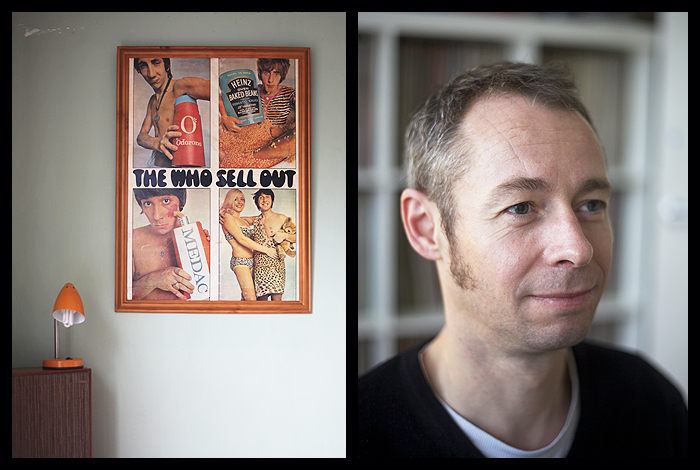
Eric could hear someone in the garden, it was three in the morning. He opened the bedroom window, there were four cops outside. They were all bent double laughing. Their car was pulled up, blue lights still flashing and a scooter lay across the pavement. They’d been chasing a thief when he jumped off the stolen bike, leapt over Eric’s garden wall and escaped across the neighbour’s patio. One policemen, in not so hot pursuit, failed to scale the wall and now sat breathless, surrounded by bricks and rubble while his colleagues looked on, convulsed with giggles. After they’d composed themselves they took a statement so an insurance claim could be made for the collapsed wall. They sat in Eric’s kitchen under his poster of The Who’s ‘Sell Out’ album. One of the policemen, it turned out, was a fan of The Who. He offered to buy the poster. Eric agreed, he’d bought it on a whim from a brocante in Toulouse. But the policemen never called back, the thief, as far as Eric knows, was never caught and the poster was never claimed.
08 Dec 2013
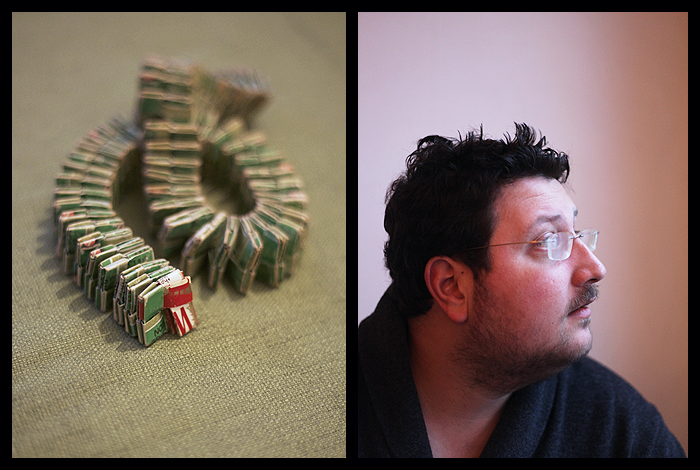
The camp wasn’t in the middle of nowhere, it was on the outskirts of nowhere. When Itamar missed the bus he had to walk an hour through the desert from Shivta. His military service ended at 21 and he’d only just turned 18. His regiment, The Rams, moved every three months but this did nothing to alleviate the boredom. He was already tired of the smell of boot polish and WD40, of the endless sand and the routine of army life. Thursdays were good though. He got to go home and was back in Jerusalem for Shabbat. Sundays weren’t so good. So this particular Sunday he stayed home with his girlfriend. Going AWOL meant when he returned to camp, it wasn’t to his usual dorm but to a cell. The boredom was more extreme but ‘it wasn’t so different from the regular army’. Itamar passed the time smoking cigarettes and bartering for cigarettes. He wrote appeal letters for inmates in exchange for ten-packs of ‘the roughest Israeli smokes’, each green packet made four links to his chain. This chain represents each day of his time in prison, the last red link is taken from the celebratory Winston that he smoked on his release.
01 Dec 2013
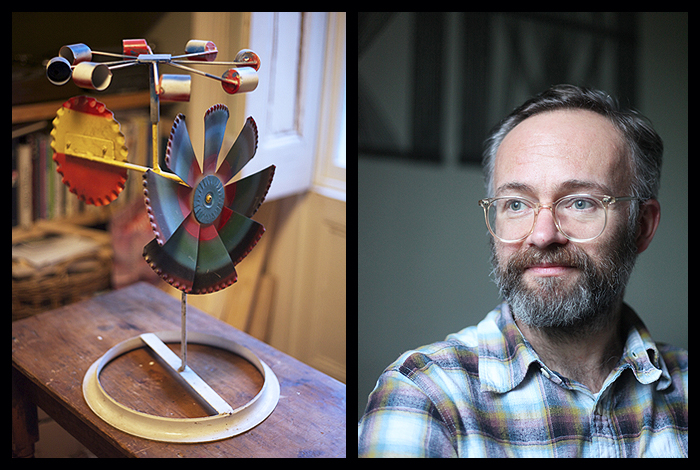
Vollis and his dad moved houses. They didn’t box up people’s belongings. They transported whole buildings. And bridges. And barns. Each job threw up new problems so the work required a creative mind. In his 20s Vollis was stationed on the island of Saipan in the South Pacific, he was an Air Force staff sergeant. The skills he’d acquired working for his pop in North Carolina were put to use again. Thousands of army uniforms were laundered in a huge washing machine powered by a windmill he’d made from parts of a decommissioned B-29 bomber. When he returned to his home town of Lucama he opened a repair shop. He used scrap from the local junkyard, timberyard and boatyard. He retired at 65 and, never having been ‘the type to sit down and do nothing’, he began to construct windmills, 50 foot windmills. In the mid 90s the man who ‘just built windmills’ became known as an artist. Wilfrid interviewed him for the art magazine ‘Raw Vision’ and bought a small whirligig (windmill). Vollis’s local town, a faded trading centre, has now stopped hosting the annual Tobacco Festival Parade and instead hosts the Wilson Whirligig Festival.
17 Nov 2013
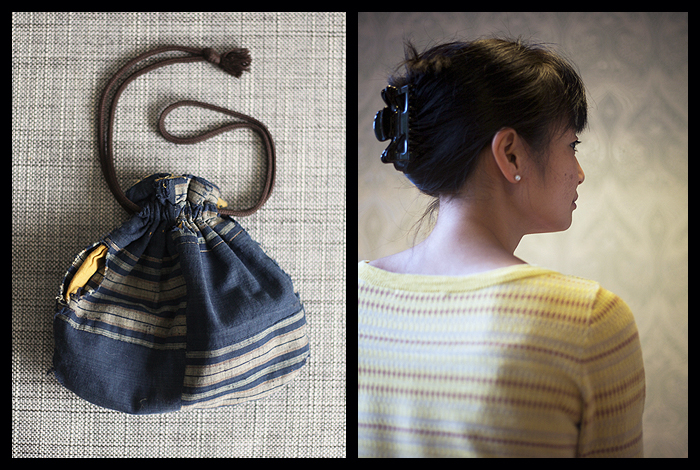
Three planes flew across the expanse of blue. A cluster of small clouds sprung from the clear sky and grew like ink in water. The bomb hit Hiroshima less than a minute later. The bomb’s mid-air detonation dispersed the explosion maximising destruction to the city below. The Japanese army assumed that the planes picked up by the radar were on a reconnaissance trip to assess the weather. But the Americans already knew that the conditions were right. They had a clear view, not only of the target, but also of the impact of the atomic bomb, the first ever dropped in warfare. On 5th August 1945 Chieko and Saburo boarded a cramped train with their young son Takeshi. They were increasingly uneasy living in Hiroshima with its large military base so they moved 200 miles to the west, to Fukuoka. Had they decided to leave just one day later they would never have had their daughter Akiko and Akiko would never have had Maki. Chieko, Maki’s grandmother, made kimonos throughout her life, she made this bag from an old one she’d worn until it was threadbare. She gave it to Maki, urging her to have a daughter so she could make her a kimono. Chieko died at 88, just two years before Maki was married.
10 Nov 2013
Christine and Richard had three children. It was 1979 and in a small village just north of Cambridge women’s lives revolved around shared babysitting, ‘having babies and meeting up for tea’ to discuss babies. Christine’s days were spent caring for her sons. And sometimes her friends’ sons. But only sons. It had been years since a girl had been born and an odd fear was developing in a few of the villagers that something was preventing the conception of girls. In early 1980 Christine’s bump began to show, she was pregnant with her fourth child. There was heightened anticipation in the small community, if Christine didn’t give birth to a girl young couples might actually consider leaving the village. On the 10th of September Christine gave birth – to a girl, Rebecca Louise. The villagers collectively shook off their irrational panic and celebrated. This little mug was a present given to baby Rebecca on the day she came home from the hospital.
03 Nov 2013
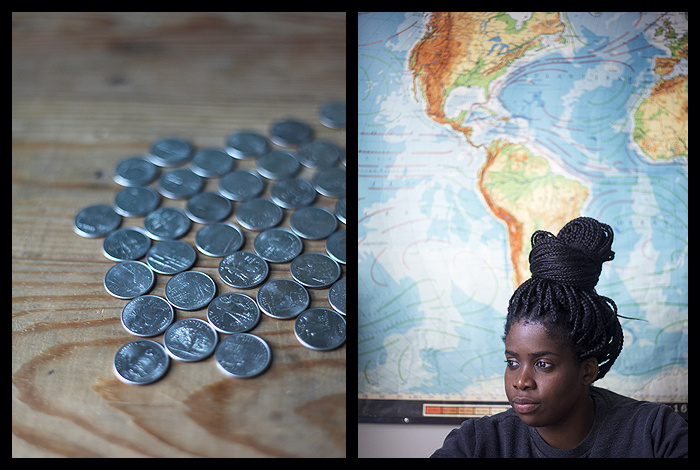
She sat stroking the carpet listening to Bobby Brown. She idled down the sunny street eating burritos with her sisters, Sunmi and Funmi. She played football with her uncle’s dog in the yard. Even at 7 years old Wunmi remembers consciously feeling at home. Twenty years later she was back there. Her choice of where to study was dictated by which universities partnered with US colleges. King’s College, London offered a degree in American Studies with a year at the University of California, San Diego. And the girl who hated camping in cold, damp England became the girl who spent successive weekends eating s’mores under the stars. In her first year, she was still unfamiliar with the currency and was too embarrassed to have shop assistants wait while she worked out how to pay them in change. Her purse was heavy with dimes and quarters. She noticed that the quarters were all different, that they each represented 1 of the 50 states. This is the collection she amassed, she is 6 short, so she’ll have to go back – to find Alaska, Iowa, Wyoming, Mississippi, New Mexico and Hawaii.
27 Oct 2013




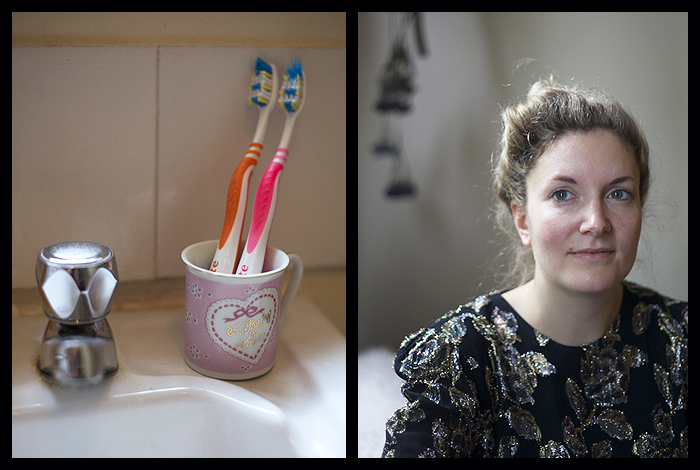

 Subscribe to RSS
Subscribe to RSS Follow us on Twitter
Follow us on Twitter